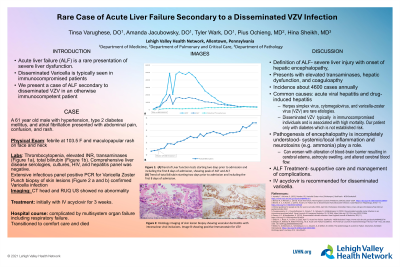Tuesday Poster Session
Category: Liver
P4775 - Rare Case of Acute Liver Failure Secondary to a Disseminated VZV Infection
Tuesday, October 29, 2024
10:30 AM - 4:00 PM ET
Location: Exhibit Hall E

Has Audio

Tinsa Varughese, DO
Lehigh Valley Health Network
Allentown, PA
Presenting Author(s)
Tinsa Varughese, DO, Amanda Jacubowsky, DO, Pius Ochieng, MD
Lehigh Valley Health Network, Allentown, PA
Introduction: Acute liver failure (ALF) is a rare presentation of severe liver dysfunction with a yearly incidence of about 4,600 cases. Common causes include acute viral hepatitis and drug-induced hepatitis. Rarely, the etiology is due to other viruses including herpes simplex virus, cytomegalovirus, and varicella-zoster virus (VZV). Here we present a patient with acute liver failure secondary to disseminated VZV.
Case Description/Methods: A 61-year-old male with a past medical history of hypertension, type 2 diabetes mellitus, and atrial fibrillation presented to the emergency department with abdominal pain, confusion, and rash. He had been in his normal state of health the day before arrival and had returned from Ghana to the US 3 weeks prior. On physical exam, he was found to be febrile to 103.5 F and a maculopapular rash on his face and neck was noted. Laboratory testing revealed a platelet count of 24 thou/cmm, INR 2.2, AST 1,598 U/L, ALT 1,643 U/L, total bilirubin 2.1 mg/dL, and alkaline phosphatase 148 U/L. A CT head and right upper quadrant ultrasound with dopplers were negative. Additional laboratory testing including comprehensive liver disease serologies, cultures, and hepatitis panel were negative. Biopsy was deferred due to coagulopathy. Infectious disease was consulted, and a further workup revealed a positive VZV PCR and positive VZV antibody IgG level at 335.9, requiring a course of acyclovir. Due to worsening encephalopathy, hypotension, and acute liver failure, the patient was transferred to the intensive care unit. His hospital course was complicated by multisystem organ failure. Ultimately, he transitioned to comfort measures only.
Discussion: Patients with acute liver failure typically present with encephalopathy due to increased ammonia crossing an altered blood-brain barrier resulting in cerebral edema and astrocyte swelling. Patients also present with coagulopathy, prolonged INR, thrombocytopenia, and elevated transaminases and bilirubin. Treatment for acute liver failure is mostly supportive care with management of complications. VZV is a rare cause of fulminant liver failure with only handful documented case studies. Typically, disseminated VZV is usually seen in immunocompromised individuals and carries a high mortality. The primary treatment for disseminated VZV is intravenous acyclovir. Circulatory dysfunction and systemic hypotension are common in patients with both disseminated VZV and ALF, as seen in our patient who required pressor support.
Disclosures:
Tinsa Varughese, DO, Amanda Jacubowsky, DO, Pius Ochieng, MD. P4775 - Rare Case of Acute Liver Failure Secondary to a Disseminated VZV Infection, ACG 2024 Annual Scientific Meeting Abstracts. Philadelphia, PA: American College of Gastroenterology.
Lehigh Valley Health Network, Allentown, PA
Introduction: Acute liver failure (ALF) is a rare presentation of severe liver dysfunction with a yearly incidence of about 4,600 cases. Common causes include acute viral hepatitis and drug-induced hepatitis. Rarely, the etiology is due to other viruses including herpes simplex virus, cytomegalovirus, and varicella-zoster virus (VZV). Here we present a patient with acute liver failure secondary to disseminated VZV.
Case Description/Methods: A 61-year-old male with a past medical history of hypertension, type 2 diabetes mellitus, and atrial fibrillation presented to the emergency department with abdominal pain, confusion, and rash. He had been in his normal state of health the day before arrival and had returned from Ghana to the US 3 weeks prior. On physical exam, he was found to be febrile to 103.5 F and a maculopapular rash on his face and neck was noted. Laboratory testing revealed a platelet count of 24 thou/cmm, INR 2.2, AST 1,598 U/L, ALT 1,643 U/L, total bilirubin 2.1 mg/dL, and alkaline phosphatase 148 U/L. A CT head and right upper quadrant ultrasound with dopplers were negative. Additional laboratory testing including comprehensive liver disease serologies, cultures, and hepatitis panel were negative. Biopsy was deferred due to coagulopathy. Infectious disease was consulted, and a further workup revealed a positive VZV PCR and positive VZV antibody IgG level at 335.9, requiring a course of acyclovir. Due to worsening encephalopathy, hypotension, and acute liver failure, the patient was transferred to the intensive care unit. His hospital course was complicated by multisystem organ failure. Ultimately, he transitioned to comfort measures only.
Discussion: Patients with acute liver failure typically present with encephalopathy due to increased ammonia crossing an altered blood-brain barrier resulting in cerebral edema and astrocyte swelling. Patients also present with coagulopathy, prolonged INR, thrombocytopenia, and elevated transaminases and bilirubin. Treatment for acute liver failure is mostly supportive care with management of complications. VZV is a rare cause of fulminant liver failure with only handful documented case studies. Typically, disseminated VZV is usually seen in immunocompromised individuals and carries a high mortality. The primary treatment for disseminated VZV is intravenous acyclovir. Circulatory dysfunction and systemic hypotension are common in patients with both disseminated VZV and ALF, as seen in our patient who required pressor support.
Disclosures:
Tinsa Varughese indicated no relevant financial relationships.
Amanda Jacubowsky indicated no relevant financial relationships.
Pius Ochieng indicated no relevant financial relationships.
Tinsa Varughese, DO, Amanda Jacubowsky, DO, Pius Ochieng, MD. P4775 - Rare Case of Acute Liver Failure Secondary to a Disseminated VZV Infection, ACG 2024 Annual Scientific Meeting Abstracts. Philadelphia, PA: American College of Gastroenterology.
